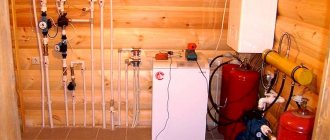Residents of apartments are deprived of choice, and, as a rule, they do not have a question about what is cheaper to heat the house: gas or electricity. However, such a dilemma often occupies the minds of owners of private buildings. After all, the choice of one of the options determines not only the ease of operation of the heating system, but also the amount of monthly cash costs. If you choose at random, without considering the advantages, disadvantages and cost of both heating options, there is a chance of making a mistake, the elimination of which will bring large costs in the future.
Electric heating
You may be interested in: Determination of financial results: accounting procedures, accounting entries
This method involves the use of boilers, which are divided into two types, namely floor-mounted and wall-mounted.
The operating principle is quite simple. The steel tank contains tubular electric heaters that convert electricity into heat. These elements heat the coolant, and then, thanks to the circulation of water, the building is heated.
The difference between a gas and electric boiler
These devices need to be compared based on the features of their operation and use. First of all, the following is taken into account:
- Operating principle of the unit. For example, in the BAXI ECO4S 24 F gas boiler, as in other gas-powered equipment, there is a coil through which the coolant passes. It is located next to the burner, with the help of which heating occurs. Electrical devices directly heat the coolant using electricity.
- Equipment stability. When comparing operation stability, we can conclude that in both cases there is a high risk of periodic interruptions. Electrical appliances are highly dependent on mains voltage. Any changes have a bad effect on their work. The same can be said about gas boilers, which react sharply to changes in gas pressure in the pipeline.
- Safety of use. Electric boilers are considered safer. There are no problems with them if you have high-quality wiring that matches the power of the equipment. Unlike electric ones, gas appliances are potentially dangerous to people. After all, they work on the basis of a burner, which must periodically ignite and extinguish. Failures in this process may result in an explosion or gas poisoning. Therefore, strict requirements are imposed on the installation of gas appliances, and their adjustment must be carried out only with the help of modern automation.
- Ease of Management. When deciding which is better: a gas or electric heating boiler, do not rely only on the control features. In this regard, both types of units have been improved to the maximum. You can control the device using a home thermostat or even remotely. It all depends on the model, its functionality and price.
Advantages of electric heating
You may be interested in:Best car insurance companies: rating
Channel PROGRAMMER'S DIARY
The life of a programmer and interesting reviews of everything. Subscribe so you don't miss new videos.
Any method of heating a room has certain advantages:
- Availability and ease of installation. These are perhaps the most important advantages. In addition, there is no need to coordinate the project, which further reduces the financial costs of implementing the idea.
- Easy to maintain. Agree, during operation it becomes important not only what is cheaper: gas or electricity. Equally important is saving time due to the fact that this type of boiler is easy to maintain. In particular, there is no need to carry out preventive maintenance or periodic cleaning of equipment elements.
- Environmentally friendly. Electricity is one of the environmentally friendly fuels, which allows you not to worry about the safety of the environment. However, it is worth noting that not all home owners pay sufficient attention to this issue.
Example of calculating heating costs
Let's take as an example a cottage with an area of about 200 m2 in the vicinity of Barnaul. The average heat loss of a house made of aerated concrete with 50 mm insulation will be about 8000 W, and the maximum will be 18000 W. The duration of the heating period is 235 days or 5640 hours.
Let's calculate the capital costs of installing boilers and providing access to energy resources. When organizing home heating using electricity, the costs will be as follows:
- Connection of additional power up to 30 kW – 15 t.r.
- Three-phase electric boiler Ferroli Zews 28, power 28 kW - 51 tr.
- Heat accumulator S-Tank HFWT series for 750 liters – 54 tr.
- Installation of equipment – 4 tr.
Total: Ne1 = 70 tr, and taking into account the heat accumulator: Ne2 = 124 tr.
A boiler of such power is necessary if the consumer plans to heat the house at night using a differentiated tariff. When compensating for average heat losses of 8 kW, a boiler power of 28 kW is required if the equipment operates 7 hours a day. In severe cold weather, a boiler of this power will have to be turned on during the day.
An electricity supply organization can connect more than 15 kW to a house only if this is technically possible. If the networks are overloaded or worn out, a failure may occur
Let's calculate the capital costs of supplying gas and installing boilers powered by it:
- Technological connection of main gas. The house is classified in the first category, i.e. is located at a distance of less than 200 m from the pipe and does not require the installation of reduction gears. If this is not the case, then the price will be higher. They paid 28 thousand rubles for connection.
- Laying a gas pipeline through the site. Topoplan preparation, project development, its approval and registration, construction, installation and commissioning works. Payment under the contract amounted to 85 thousand rubles.
- For liquefied gas, it is necessary to purchase and install an underground gas tank with a volume of 2.5 m3 and lay a pipeline to the boiler. Turnkey price – 270 tr.
- Gas boiler Viessmann WH1D272, power 24 kW - 90 tr.
- Installation of equipment – 8 tr.
- Putting the entire system into operation with a call from an Altaikraygas inspector - 45 rubles.
In total, capital costs for heating using main gas will be: Ng1 = 256 tr., and liquefied: Ng2 = 413 tr.
Equipment maintenance costs (minor repairs and maintenance) can be taken equal to 10% of its cost. However, for the supply of gas it is necessary to conclude an agreement, and payment for annual inspection services will also be required. Calling a BarnaulGorGaz specialist will cost 3 thousand rubles.
Therefore, for an electric boiler the cost of annual maintenance is: Re = 5.1 t.r., and for gas equipment: Rпг = Rсг = 12 t.r.
According to Decree of the Government of the Russian Federation No. 410 of May 14, 2013, mandatory annual maintenance of in-house gas equipment can be carried out by organizations included in a special register
Let's calculate the amount of energy required for the winter period:
- electricity: Ve = 46 mW × h;
- natural gas: Vpg = 5273 m3;
- liquefied gas: Vсг = 3892 kg.
Energy costs for the entire winter period will be as follows:
- Electricity. With a single-tariff connection in rural areas, 1 kWh costs 3.2 rubles. Eе1 = 46000 × 3.2 = 147.2 tr.
- Electricity. With a two-tariff connection in rural areas, 1 kWh = 2.07 rubles. Ee2 = 46000 × 2.07 = 95.2 t.r.
- Natural gas. Its cost is 6.45 r/m3. Epg = 5273 × 6.45 = 34 t.r.
- Liquefied gas. Its cost will be 36.1 rubles / kg. Esg = 3892 × 36.1 = 140.5 tr.
The price for liquefied gas is given taking into account two refills of a gas tank with a volume of 2.5 m3.
After these calculations, the heating cost equation will take the form:
- for electricity at the general tariff: Se1 = 70 + 152.3 × T;
- for electricity at a two-zone tariff: Se2 = 124 + 100.3 × T;
- for natural gas: Spg = 256 + 46 × T;
- for liquefied gas: Sсг = 413 + 152.5 × T.
From these numbers you can get an idea of how profitable a particular type of fuel is.
The dynamics of heating costs can most easily be traced using a graph of the growth of investments versus time. The equations are simple and linear
For this particular facility, we can conclude that the best heating method is to use mains gas. In just three years it will prove to be the most economical type of heating.
Installing an electric boiler is cheaper and faster, as it requires fewer approvals. But subsequently, paying for electricity will lead to more serious expenses than when using main gas. The two-tariff system will pay for itself in the first year.
Heating based on liquefied gas is absolutely unprofitable economically. It can only be used if there is no technical possibility of connecting to both main gas and electricity with a power of 30 kW or more.
Disadvantages of heating with electricity
You should not ignore the disadvantages of this type of heating in search of an answer to the question of what is cheaper: gas or electricity. Let's list them briefly.
- First of all, it is expensive. In Russia, electricity is considered the most expensive type of energy.
- It is necessary to maintain constant power to ensure the operation of the boiler.
- Power outages that result in the inability to heat the living space.
- Inconvenient to use. Experts assure that the use of electric heating is an irrational idea for owners of houses whose area exceeds one hundred square meters.
Which heating is more profitable?
If you compare 2 types of boilers for their efficiency, then you should take into account not only the cost of the energy carrier, but also all the costs necessary for installing the heating system.
To calculate the energy efficiency of using different types of equipment, you need to calculate the gas and electricity consumption for heating the coolant during operation of the heating system.
Energy consumption is indicated in the technical specifications of the equipment. If you need to heat a room 5 months a year, then for a house of average size you will need to spend about 27,000 kW of electricity, which is 63,000 rubles at current electricity prices.
When heating a similar house with a gas boiler, you will need to spend about 14,192 rubles per year for these purposes.
From an economic point of view, installing a gas unit is more profitable, even taking into account:
- costs of connecting to the main gas pipeline;
- high price of the device;
- high cost of commissioning work.
Heating residential premises with natural gas is cheaper. A minor drawback can be considered a lower degree of practicality and comfort in using such a boiler.
Installing electric heating systems can be beneficial in small buildings whose area does not exceed 40-60 square meters. m. Installation of an electric boiler is justified in houses where you plan to live temporarily or where you plan to visit only on weekends.
In such a situation, the low connection price and low cost of equipment allow you to quickly recoup the costs of equipping your home with a heating system. The use of various methods of reducing energy consumption allows you to save a lot of money on heating residential premises.
To reduce energy consumption to maintain a comfortable microclimate in the house in the absence of the ability to program the operation of the heating system, it is recommended to connect a room thermostat to both the gas and electric units. This device allows you to regulate the operation of the boiler not according to the degree of heating of the coolant in the line, but according to the air temperature in the room.
When using electric equipment for heating, it is advisable to install a 2- or 3-tariff meter, which will also reduce the cost of maintaining the microclimate in the room. The costs of purchasing, installing and designing the device are recouped in a few months by reducing energy costs by 15-20%.
Gas heating
Gas is considered an energy-intensive fuel, the combustion of which releases a considerable amount of heat. Modern heating boilers are characterized by high efficiency, compact size, autonomous operation and ease of maintenance.
However, you need to understand that the boiler itself will not be able to cope with the function of heating the room. This will require the creation of a heating system, which, in addition to the boiler, will include aluminum or cast iron batteries connected by pipes through which water circulates.
Calculation of energy efficiency of an electric boiler
Calculating the parameters of an electric boiler is much simpler: you pay according to the tariff - how much you “burnt” is what you pay for.
There is one more “plus” when it comes to such boilers - their efficiency is almost never below 95 percent, or even reaches 99%. What does this mean for the consumer? You get at least 950, or even all 990 W of heat from 1 kW of energy, and if you choose a high-quality model (Protherm 6K), you will get a negligible, almost imperceptible drop in efficiency. The losses are so insignificant that they are neglected in calculations.
Again, without taking into account the current electricity tariff, since it will change, we make a conditional calculation. We take as an example the same area of 70 m², power 100 W/m², average load 50%, consumption rate 0.1 kWh and multiply the parameters by 24 and 30, first obtaining the average daily indicator, and then the average monthly. As a result, we get 2520 kWh/month per month.
Advantages of gas heating
This method of heating a room certainly has certain advantages. Namely:
- Cheapness. The use of this type of fuel is beneficial from an economic point of view. Heating with gas is cheaper than with electricity. This is why the initial costs are recouped as the equipment is used.
- Environmentally friendly. Experts assure that gas combustion does not produce harmful substances that can pollute the environment.
What is cheaper: gas or electricity?
The answer to this question is obvious. Many people know that gas heating is cheaper. This justifies the high popularity of this type of fuel in Russia.
If we make a comparison, it turns out that electricity costs approximately twice as much as the energy that can be obtained by burning liquefied gas.
Now you know which is cheaper to heat: gas or electricity.
If your choice is the second option, be prepared for the fact that the amount on your utility bill will be impressive. Especially during cold periods of the year, when you have to heat the room to a more or less comfortable temperature.
You are master
The answer to the question of which heating to choose for a private home – gas or electric – is not always clear and depends on many factors. In this article, we will consider the advantages and disadvantages of these types of heating, based on personal experience. In my private house, I initially installed electric heating, simply because there was no possibility of connecting to gas. Four years later, gas was installed along the street, I redid the heating system and connected the gas. I did not consider heating with solid or liquid fuel, since such heating is quite inconvenient to operate and requires a lot of time to devote to maintenance. If there is no opportunity or desire to devote a lot of time to servicing the heating system, and, as they say, “turn it on and forget it”, only occasionally observe the work, then the best options are gas or electric heating.
When planning heating, you must immediately foresee how the hot water will be heated and what kind of stove there will be, gas or electric. The answer seems obvious and logical. If the heating is gas, then water heating can be provided from a double-circuit heating boiler, and a gas stove can be installed. But this is not always the right decision. For example, after talking with other home owners, I found out that if you constantly heat water for use with a special double-circuit gas boiler, then the boiler will not work for a long time. Already, after about a year, problems begin with the boiler; it has to be repaired, descaled, heat exchangers changed, etc. And after about 2-3 years the boiler becomes unusable. Gas boilers especially often fail if the water quality in the system is not ideal. Replacing a boiler is quite an expensive undertaking; moreover, if the boiler “stops” during severe frosts, then there is a possibility that the heating system will defrost if the boiler is not promptly replaced. Therefore, it makes sense to heat water for use using an electric storage water heater. In this case, the heating boiler will work with the same volume of water in the system, without the constant flow of water from the water supply system, which significantly increases the service life of the heating boiler. Installing a gas stove, in the presence of gas heating, is also not always the optimal solution. Firstly, an electric kitchen stove is safer than a gas stove, since an open fire is not used, this is especially true if there are small children living in the house. Secondly, installing a gas stove can be difficult due to the need to connect a gas pipe to the kitchen. Therefore, given the fact that modern electric cookers have a fairly high efficiency, you can consider installing an electric cooker, even if there is a gas connection.
Connecting electric heating does not require special permission. But it is necessary that, in technical conditions, sufficient power is allocated. As a rule, at the moment, electric grid companies allocate up to 15 kW without any problems. Which will be quite enough for the needs of consumption and electric heating of the house, up to approximately 150 m². If necessary, you can request more power, but it will cost more and will be allocated if technically possible. Also, if you plan to connect electric heating, it is best to make a three-phase connection at home. You can read about the advantages of a three-phase connection in this article.
In most cases, the initial cost of connecting electric heating will be significantly lower than the cost of connecting gas heating. So the cost of an electric boiler is an order of magnitude less than the cost of a gas boiler. To connect an electric boiler, you may need to redo the electrical connection at home, replace the input cable, increase the power of the circuit breakers, lay a separate cable from the input panel to the electric boiler. But even if you have to redo something, the cost of an electrical connection will be cheaper than a gas connection.
The advantages of electric heating include the fact that electric boilers are smaller in size compared to gas boilers. For example, one of the most efficient, an electrode-type electric boiler, is one of the smallest heating boilers, and practically does not take up space, but fits into the pipe of the heating system. Connecting an electric cable to the boiler is much easier than running a gas pipe. Also, an electric boiler does not require connecting a chimney pipe, which greatly simplifies the choice of location for installing the boiler.
The most serious disadvantage of electric heating is the significantly high payments for electricity spent on heating. This disadvantage, as a rule, covers all the advantages of electric heating.
The main disadvantage of gas heating is the high cost of gas connection. If there is no gas pipe running along your street, then the cost of supplying gas from neighboring streets can be simply enormous. The fact is that the gas supply organization is not obliged to supply a gas pipe to your house for free, even if there is gas on the neighboring street. Unlike gas supply, the energy supplying organization is required to connect an electric line to your home if your home is located less than 300 meters in the city or 500 meters in the countryside from an existing power line, and for this you will pay only 550 rubles. A gas supply organization can install a gas pipe for free only if your street is included in the gasification plan. It is impossible to influence when your street will be included in the gasification plan or whether it will be included at all. And it is quite expensive to pull a gas pipe along the street at your own expense, even if you share with your neighbors, especially if the distance to the existing gas network is significant. Therefore, land plots for building a house, with gas pipes laid along the street, are much more expensive than non-gasified plots. But even if the pipe runs along your street, connecting a gas pipe to a heating boiler will be quite expensive. The specific cost can be obtained from the gas supply organization. For me personally, running a pipe from an underground pipe (the pipe was laid along the street for free) to the boiler room, with registration of projects (external and internal gas supply), in 2014 cost approximately 45,000 rubles.
To install a gas boiler, it is best to allocate a separate room. It should be well ventilated. It is necessary to provide the possibility of supplying a gas pipe and a chimney pipe to the boiler installation site. If the boiler is volatile, then it is necessary to connect an electrical outlet. The boiler's power supply must be connected through an electrical voltage stabilizer. To eliminate the impact of power surges in the network on the boiler electronics. The energy dependence of the boiler can be reduced by using a UPS (uninterruptible power supply), which can ensure the operation of the boiler even after a power outage. Modern gas boilers are quite small in size. Recently, it is preferable to install wall-mounted gas boilers. They are installed on the wall; if the network has flammable material, then a non-flammable paronite gasket is first attached to the wall. The chimney pipe of such boilers is simply routed through the wall and does not require the installation of an additional pipe to raise the smoke emission above the roof. The cost of a gas boiler depends on the type, power, brand and can be several times higher than the cost of an electric boiler. Gas boilers also tend to fail more often than electric boilers.
Installing a gas boiler on the wall
But despite the high cost and disadvantages, gas heating is the most economical, due to the low cost of gas compared to electricity. For example, I will give the costs of electric and gas heating. Costs are approximate, based on personal experience heating a private house of 130 m².
As can be seen from the table, the costs of electric heating are much higher than those of gas heating. Even if you have to replace your gas boiler this season, the cost of gas will still be significantly less than the cost of electricity.
Unfortunately, owners of private houses do not always have the technical ability to connect gas, so they have to choose more expensive electric heating. If initially, when building a house, you already plan to install electric heating, then pay special attention to the effective insulation of the house. It will make sense to spend more money on the use of insulation and energy-efficient windows, but in the future save on utility bills.











